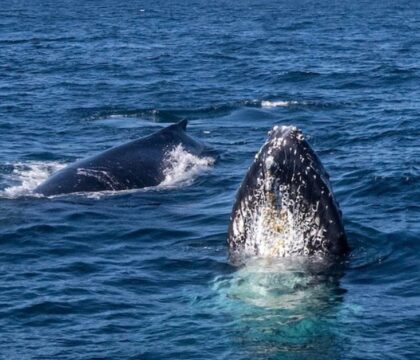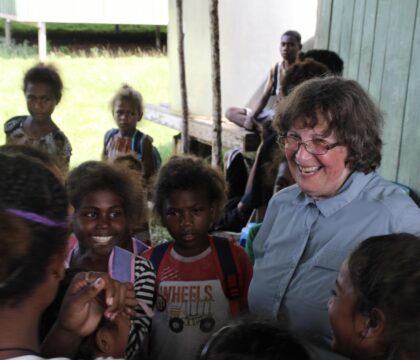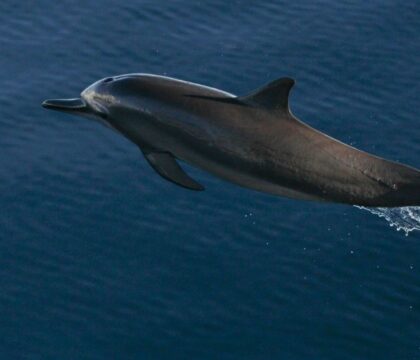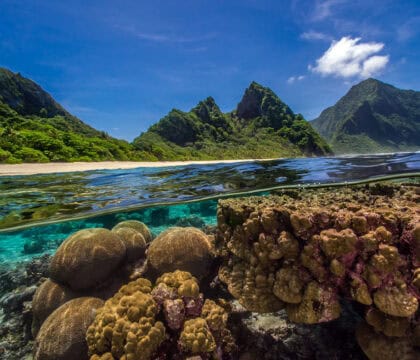July 9, 2025 • Field Notes
Why Naturalists Matter
At the heart of every Oceanic Society expedition is a naturalist — a guide who brings the wild to life and helps travelers forge deep, lasting connections with nature on our ecotourism expeditions. These experiences in nature can shift perspectives and instill an eagerness to preserve the natural world – a theory which is backed by science – and a crucial component of our mission to build a global grassroots ocean conservation movement.
We know this transformation is possible because many of us at Oceanic Society, including our naturalists, have experienced it firsthand.
In this new Q&A series, From the Field, we introduce the naturalists who shape these journeys: what inspires them, how they connect with people and place, and why they keep returning.
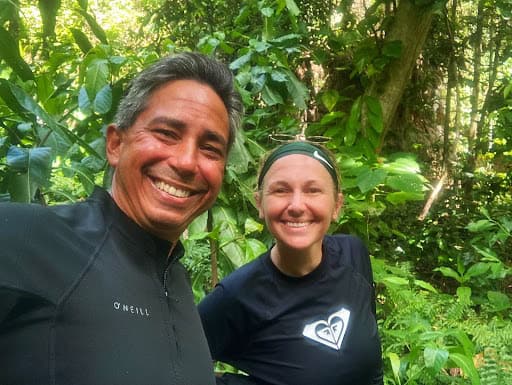
Raymond Boland with Rosie Jeffrey, Oceanic Society’s manager of strategic partnerships (and expedition leader), posing for a photo in the jungles of Palau. © Raymond Boland
Meet Oceanic Society Naturalist, Ray Boland
To start off, we spotlight Raymond Boland, an Oceanic Society naturalist who leads expeditions to Palau, the home of the legendary Rock Islands. Ray also brings past experience leading Oceanic Society trips in Raja Ampat and the Banda Sea.
A Career in Marine Science and Conservation
Ray is based in Hawaii and is a research biologist focusing on the Hawaiian islands at the National Oceanic and Atmospheric Administration (NOAA) Fisheries (also known as the National Marine Fisheries Service), the U.S. federal agency responsible for the management, conservation, and protection of marine life. For over 20 years, he has worked with NOAA Fisheries, overseeing ocean conservation programs throughout the Pacific. These efforts include debris removal in his native Hawaii, tagging and monitoring endangered monk seals, and surveying fish throughout the Pacific, among other initiatives. Ray’s professional work is informed by his deep educational background: he holds both a B.S. in biology from the University of Hawaii, and a M.S. in marine science from Hawaii Pacific University.
Diving Specialist and Ocean Educator
Perhaps unsurprisingly, with so much time spent in the water, Ray is also a diving specialist and is the unit dive operator for NOAA’s Pacific Island Fisheries Science Center, where he oversees all dive safety and operations. Throughout his career, he has earned a wide range of certifications and is a passionate educator and instructor for SCUBA, CPR, and Rebreather Diving – a special form of diving which allows for extended dive times. During his free time, he is an avid photographer and, if you haven’t guessed it yet, an ocean lover who spends his free time exploring the world, often underwater.
So let’s get to know Ray at a deeper level!
Q: Where are you from and what inspired you to be a naturalist?
A: I am from Kaneohe, Hawaii, on the Island of Oahu. When I was in high school, I was introduced to an experiential marine science program called the Blue Water Marine Laboratory. Part of that program was to peer-teach on day trips aboard a University of Hawaii Research Vessel with local high school field trip groups. I first learned and then taught marine science to my peers aboard a research vessel! I have always valued being an educator, and the Oceanic Society was just a natural extension of sharing my love of the natural environment.
Q: Did you have a defining moment in nature that changed how you see the world?
A: In 1990, at the age of 21, I went on a research cruise to the Northwestern Hawaiian Islands, now known as Papahānaumokuākea. It changed my life. It changes EVERYONE’S life. The sheer wildness of the place; humans can only truly visit and never be there for long. It belongs to the animals that live there. That is when I realized what was beautiful.
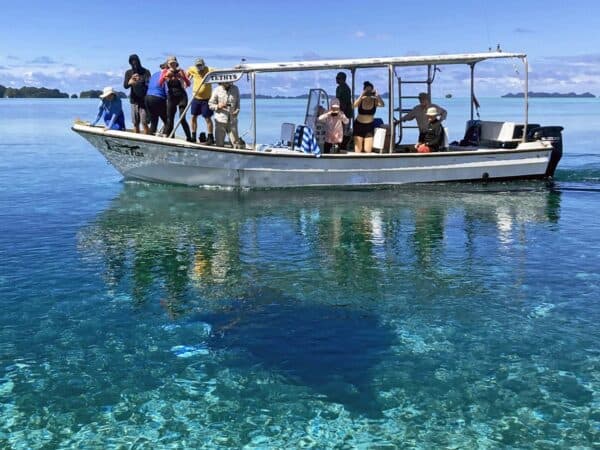
A manta ray drifts near a skiff of Oceanic Society travelers and over a bed of coral near the Rock Islands, Palau. © Raymond Boland
Q: What is your favorite aspect of Palau that you like to share with guests?
A: Palau is rich in natural history, geologic history, cultural (native) history, and world history (World War 2). My favorite thing to share is the vibrant coral reefs of Palau. Many tropical coral reefs of the world are in trouble due to climate change, but Palau’s coral reefs remain beautifuland relatively unimpacted.
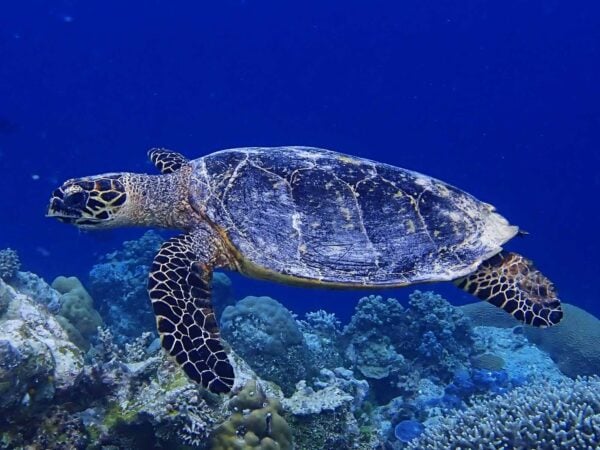
Intimate encounters with wildlife, like the hawksbill sea turtle pictured above, is a special experience while snorkeling in the Rock Islands, Palau. © Raymond Boland
Q: What surprises guests about Palau?
A: When you arrive in Palau, you arrive in the middle of the night, so you don’t see the outside world. The next morning, the guests wake up to a verdant jungle covering limestone peaks, and this beauty surprises most guests before they’ve had breakfast. Then we go snorkeling, and they are blown away by the diversity of life underwater.
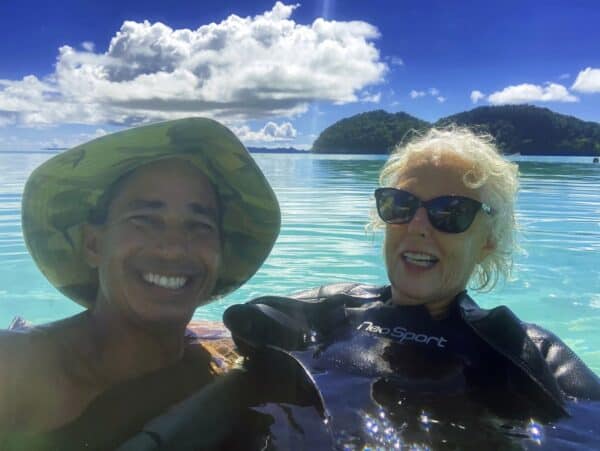
Ray and Lois during an Oceanic Society expedition to Palau. © Raymond Boland
Q: What is your favorite memory from Palau?
A: I know you are expecting some amazing biologic thing, but I have to say my favorite memory, on all three trips, is Lois [an Oceanic Society traveler].
Lois is amazing. She visited and dove in Palau in the 1980s with her husband. She is now in her 80s, and I met her on my first trip as a guide and she has been on every trip I have been on in Palau. She is always in the water the longest and happy, and comfortable the whole time. She is inspiring to me and brings the best elements of ecotourism to life. I love Lois.
Q: How do you see eco-tourism supporting the community and environment?
A: In Hawaii, we have a term called “pono”. Loosely translated, it means “right, proper, righteous, correct,” etc.
To me, ecotourism is pono tourism. I grew up in Hawaii, a tourist destination, and I have seen the degradation in how tourists treat a place. Ecotourism isn’t just sensitive to the environment; it is sensitive to the people who live there, who originate there. Ecotourism teaches you to be sensitive to a place and its inhabitants, both human and non-human.
Q: What do you hope guests take away from their experience?
A: An appreciation for the plethora and diversity of life below the water. I hope they are truly in awe of what they see while wearing a snorkel mask.
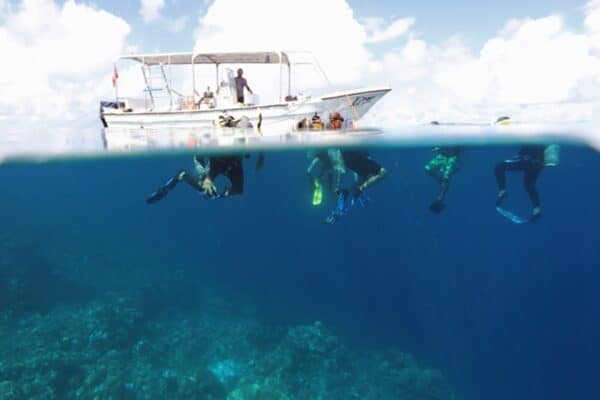
A group of Oceanic Society travelers get ready to explore the vibrant marine ecosystems of Palau. © Raymond Boland
Q: What are some ways guests can continue to support conservation efforts after they leave?
A: It is entirely simple. Guests do not need to adopt huge changes in their lives to make an impact on the world. I personally try to avoid using single-use plastic containers, such as water bottles. I opt for glass, aluminum, or cardboard. That alone will cut down on plastic waste that may end up in the ocean. You can participate in clean-ups, you can support non-profits who conduct research or clean-ups. Finally, share your experiences. A news article or report is one thing, but when you make it personal, about how seeing something beautiful in its natural habitat affected you, it is far easier to get people on board with conservation.
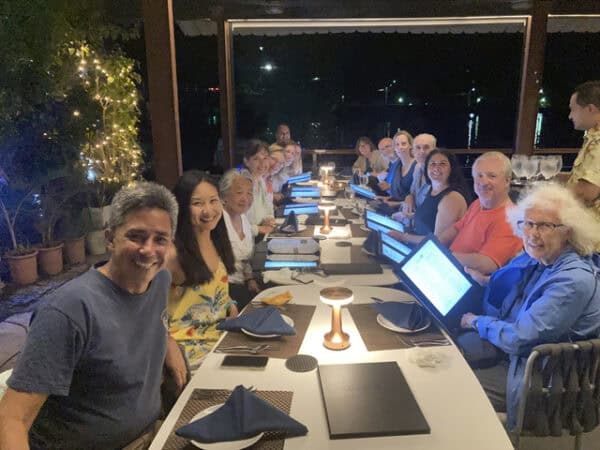
Oceanic Society travelers enjoying dinner after a day of snorkeling in Palau. Our expeditions bring together like-minded people passionate about travel and conservation. © Raymond Boland
Inspired to Explore?
We hope Ray’s story sparked your curiosity about the natural world — and the people who help us connect with it. Stay tuned for more conversations with Oceanic Society guides as we continue this Q&A series, From the Field.
If Palau is calling your name, our snorkeling expeditions to the Rock Islands run throughout the year. While guide assignments may vary, each trip is led by experienced naturalists like Ray and designed to immerse you in Palau’s stunning reefs and rich conservation story.
👉 Explore upcoming Palau Snorkeling departures and be sure to sign up for our newsletter to get expedition updates, travel inspiration, and ocean conservation insights delivered straight to your inbox.

